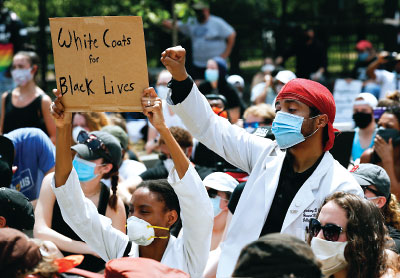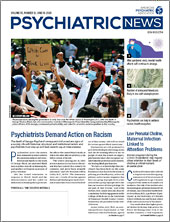Psychiatrists across the nation have demanded action to address the institutional and structural racism that led to the death of George Floyd, an unarmed Black man in police custody in Minneapolis, and sparked civil unrest in protest of police brutality.
APA has issued statements in response to Floyd’s death and the demonstrations and has called on authorities in Minneapolis to prosecute the officer who caused Floyd’s death, as well as the other officers involved, to the fullest extent of the law.
“The unrest playing out in cities across America is a reaction to the racism that has scarred this country for centuries and never been properly addressed,” said APA President Jeffrey Geller, M.D., M.P.H. “The demonstrations are a result of racism against Black people that has gone unchecked—and at times has been fostered by leaders of this country. APA will not stand for racism against Black Americans.”
Psychiatrists are well positioned to provide leadership in addressing racism and the devastating effects it has on people of color, but to have an impact, psychiatrists must also recognize racism within the profession and its history, say leading Black psychiatrists.
“We have to acknowledge that psychiatry has been built on the same foundation that has led to brutality in policing; poor health policy; and social, judicial, and economic iniquities that have one group of people down below a line and another group of people above the line and unaware of their privilege. We are part of that system,” said Altha Stewart, M.D., senior associate dean for community health engagement in the College of Medicine at the University of Tennessee Health Science Center. Stewart was APA president for the 2018-2019 term.
Ayana Jordan, M.D., Ph.D., an assistant professor of psychiatry at Yale University School of Medicine, agreed and added that psychiatrists, most of whom are white, must consider how they can best treat their Black patients in light of the history of racism in the U.S.
“The reality is that everyone has to be involved in understanding how racism can cause trauma and impair function. It is imperative that we all understand historical oppression of Black people, in the past and in the present, because it is a major influence on how people keep themselves well,” Jordan said. “It is our job to understand, as it is our job to provide a liberated space where people can express raw emotion.”
Sarah Vinson, M.D., a clinical associate professor of psychiatry and behavioral sciences and of pediatrics at Morehouse School of Medicine in Atlanta, stressed that racism must be a topic of discussion between psychiatrists and Black patients.
“It is part of your patients’ day-to-day experience, and if you cannot discuss it with them, you are not meeting their needs,” she said. “If you do not account for the way it affects how they think and see the world, you may be misdiagnosing them, overpathologizing them, or exposing them to medication side effects that aren’t warranted. If your responses [in a session] are not validating, you will be giving them a negative experience in the mental health care system. That is not only not helping, it can be quite harmful.”
The constant bombardment of violent images on the news and social media may be triggering for those with past trauma or who have witnessed flashpoints of civil unrest in the wake of racially motivated attacks and murders, said Stewart.
“I grew up in the South during the time when Reverend Martin Luther King Jr. was assassinated, and watching the footage of the military machines going through the streets [during the current unrest] reminded me of seeing that on TV as a child in Memphis,” she said. “There are moments when even I have that recoil, where this hits something deep in my soul that is not a happy place. I cannot imagine what it is like for someone who has been exposed to [past racially motivated violence] themselves or on their family to witness it over and over.”
Jordan said that racially motivated violence can cause trauma even if a patient has not directly experienced it.
“Just bearing witness can be very traumatic and result in the same psychological and physical responses we would see in primary trauma, such as inability to sleep, difficulties concentrating, low mood, and disruption in ability to function,” she said. “I have had patients who belonged to minoritized groups who are unable to work and had to call out for mental health days. Just the threat of their bodies being violated is overwhelming. They are not only scared for themselves, but for loved ones.”
Jordan added that it is reasonable to suggest that patients not watch the videos of Floyd’s death or other racially motivated acts of violence.
“There is so much in the media of Black people being killed, gunned down, and beaten down, going back to Rodney King [a Black man who was beaten by police in Los Angeles in 1991], but there is no need for repeated secondary trauma by watching it,” she said.
“The long-term, intergenerational effects of systemic and institutional racism have a tremendous impact on the mental health of people of color,” said APA CEO and Medical Director Saul Levin, M.D., M.P.A. “Psychiatrists of all races and backgrounds must come together to confront and combat racism and discrimination wherever and whenever we see it. APA stands with the Black community and all those opposed to racism to protect and improve the lives of those who have experienced discrimination and its associated trauma.” ■
“APA Condemns Police Brutality, Calls for Dialogue to Ease Civil Unrest” is posted
here.
“APA Condemns Racism in All Forms, Calls for End to Racial Inequalities in U.S.” is posted
here.






